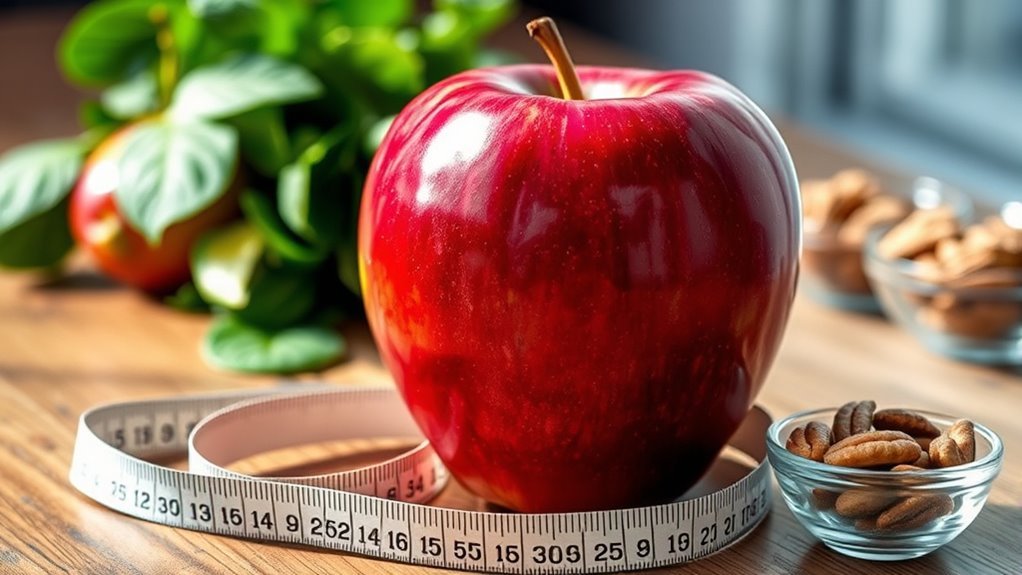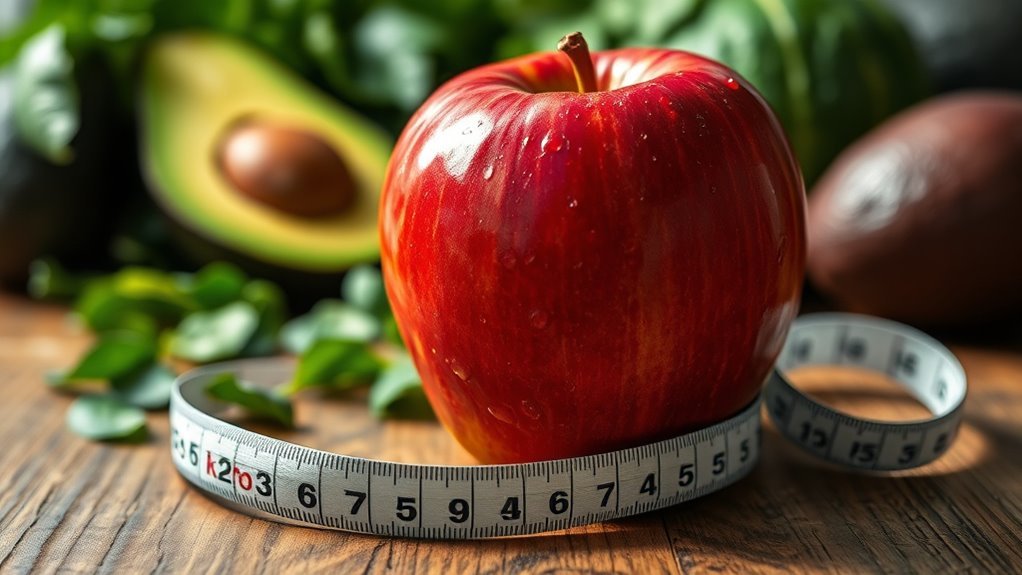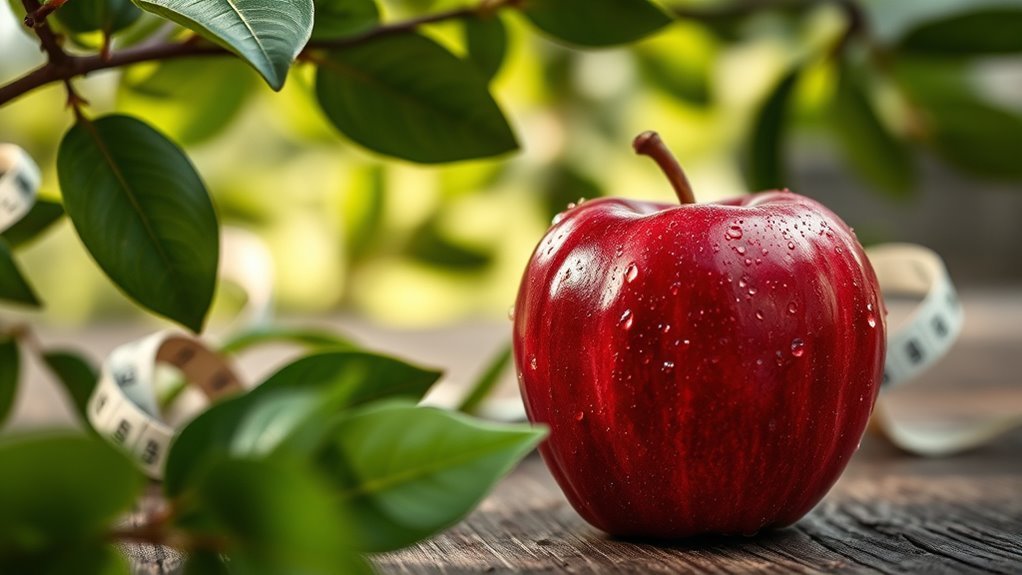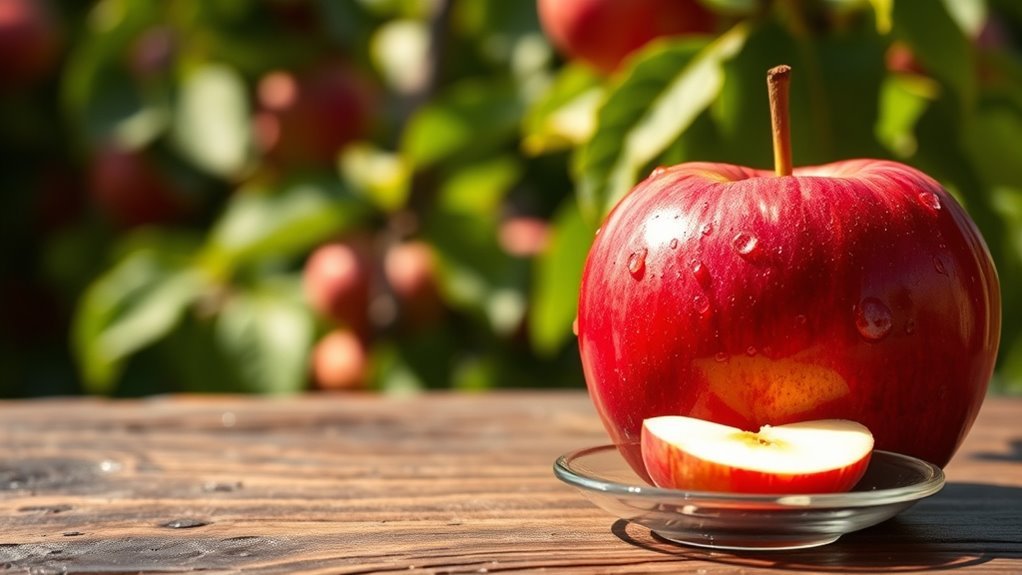You can enjoy apples on a keto diet, but you need to be mindful of their carbohydrate content. A medium apple has about 25 grams of carbs, which can impact your ketosis. To fit apples into your plan, consider smaller servings and pair them with healthy fats like almond butter. Choosing lower-carb varieties, like Granny Smith, can also help. There are more strategies and tips to keep apples in your diet while maintaining ketosis, if you’re interested.
Understanding the Keto Diet

Understanding the keto diet is essential if you’re considering it as a lifestyle choice, especially when it comes to food selection. At its core, the keto principles emphasize a high-fat, moderate-protein, and very low-carbohydrate intake. This shift in macronutrient ratios encourages your body to enter a state of ketosis, where it burns fat for fuel instead of carbohydrates. However, dietary restrictions are a key aspect to keep in mind. You’ll need to limit foods high in sugars and starches, which can be challenging but rewarding. Embracing these changes can lead to greater energy levels and potential weight loss. Remember, the freedom you seek lies in understanding how to navigate these dietary choices effectively while enjoying a satisfying variety of foods.
Nutritional Profile of Apples

When considering apples on a keto diet, it’s essential to understand their nutritional profile. Apples contain carbohydrates, but they also offer fiber and various nutrients that can impact your overall health. By examining their sugar levels and other components, you can make an informed choice about including them in your diet.
Carb Content Overview
Although apples are often celebrated for their health benefits, their carbohydrate content can be a concern for those following a ketogenic diet. Different apple varieties contain varying amounts of carbs, mainly in the form of sugars and dietary fiber. Here’s a quick overview of the carb types in apples:
- Sugars: Mainly fructose, contributing to overall carb content.
- Fiber: Some apple varieties have higher fiber, which can aid digestion.
- Total Carbs: A medium apple might contain around 25 grams of total carbs.
- Net Carbs: After accounting for fiber, net carbs can range from 15-20 grams.
Understanding these carb types can help you make informed decisions about including apples in your keto lifestyle.
Fiber and Nutrients
Apples are not just about carbs; they also pack a variety of nutrients that can be beneficial for your overall health. One of the standout features of apples is their fiber content. They’re a great source of soluble and insoluble fiber, which aids digestion and promotes gut health. This fiber can help you feel full longer, making apples a smart choice for snacking. Regarding nutrient density, apples provide vitamins C and K, potassium, and various antioxidants, all contributing to your body’s needs. While they may not be the top choice for everyone on a strict keto diet, incorporating small amounts can still offer valuable fiber sources and nutrients that support a balanced lifestyle. Enjoy them mindfully!
Sugar Levels Explained
While many people enjoy the crisp, invigorating taste of apples, it’s important to understand their sugar content, especially when considering a keto diet. Apples contain natural sugars that can impact your sugar metabolism and insulin response. Here’s a quick breakdown of their sugar levels:
- Sugar Content: A medium apple has about 19 grams of sugar.
- Net Carbs: With fiber included, the net carbs can range from 15-20 grams.
- Glycemic Index: Apples have a moderate glycemic index, affecting blood sugar levels differently for each person.
- Serving Size: Portion control is key; consider smaller apples or limit intake to stay within your carb goals.
Being aware of these factors can help you make informed decisions while enjoying the freedom of a keto lifestyle.
Carbohydrate Content in Apples

When considering a ketogenic diet, understanding the carbohydrate content in fruits is essential, and apples are no exception. Depending on the variety, apples can contain anywhere from 15 to 25 grams of carbohydrates per medium-sized fruit. For those managing carb timing, it’s vital to be mindful of these values when planning your meals. Some apple varieties, like Granny Smith, might have slightly lower sugar content compared to sweeter ones like Fuji or Honeycrisp. If you’re craving an apple, it may be beneficial to incorporate it into your daily carb allowance strategically. Remember, moderation is key, and knowing which varieties work best for your keto lifestyle can help you enjoy apples without derailing your progress.
Comparing Apples to Other Fruits
When considering your options on a keto diet, it’s essential to compare apples to other fruits regarding carbohydrate content, sugar levels, and nutritional benefits. While apples provide some vitamins and fiber, their carb count can be higher than that of berries, which are often more keto-friendly. Understanding these differences can help you make informed choices that align with your dietary goals.
Carb Content Comparison
Although apples are often considered a healthy snack, their carbohydrate content can vary considerably compared to other fruits. If you’re following a keto diet, it’s crucial to know how different apple varieties stack up against other options. Here’s a quick comparison of the carb content in popular fruits:
- Honeycrisp Apple: ~25g of carbs
- Banana: ~27g of carbs
- Strawberries: ~7g of carbs
- Avocado: ~12g of carbs
With higher carb counts, apples may not always be the best choice for keto snacks. Instead, consider lower-carb alternatives like strawberries or avocados. Always check the specific variety and serving size to stay within your carb limits while enjoying your fruit choices.
Sugar Levels Analysis
While you might enjoy the crisp sweetness of an apple, it’s important to contemplate their sugar levels, especially on a keto diet. Apples contain about 19 grams of sugar per medium fruit, which can impact your sugar metabolism greatly. When comparing them to berries, for instance, blueberries have a lower sugar content, making them a more keto-friendly choice. This difference can affect your insulin response, as higher sugar levels may lead to increased insulin release, hindering ketosis. If you’re aiming for a low-carb lifestyle, it’s essential to monitor how apples fit into your daily carb intake. Balancing your fruit choices can help you enjoy your diet while maintaining metabolic goals without feeling deprived.
Nutritional Benefits Overview
Understanding the nutritional benefits of apples compared to other fruits can help you make informed choices on a keto diet. While apples are relatively higher in carbohydrates than some fruits, they offer unique health benefits. Here’s a quick comparison:
- Fiber Content: Apples, especially with skin, provide dietary fiber, aiding digestion.
- Vitamin C: They contain antioxidants like Vitamin C, boosting your immune system.
- Hydration: Apples are about 85% water, helping with hydration.
- Variety: Different apple varieties, such as Fuji or Granny Smith, offer diverse flavors and nutrients.
While apples have their benefits, balancing them with lower-carb fruits like berries is essential for maintaining ketosis. Consider these factors to enjoy apples wisely within your keto lifestyle.
How Many Apples Can You Eat on Keto?
How many apples can you enjoy on a keto diet without derailing your progress? Well, it largely depends on your daily carb limit. A medium apple contains about 25 grams of carbs, which is significant for keto, where most aim for 20-50 grams daily. If you’re craving an apple, consider limiting yourself to a small serving, like a quarter of a medium apple, to keep your carb intake in check. This way, you can still enjoy that invigorating taste while incorporating it into your keto snacks. Remember, balance is key—if you choose to indulge in an apple, adjust your other meals accordingly to stay within your carb goals and maintain your freedom on the keto journey.
Low-Carb Apple Alternatives
If you’re looking for low-carb alternatives to satisfy that apple craving on a keto diet, you’re in luck! There are several delicious low carb fruits that can serve as apple substitutes while keeping your carb intake in check. Here are four great options:
- Berries: Strawberries, raspberries, and blackberries are all low in carbs and high in fiber.
- Avocado: Creamy and satisfying, avocados provide healthy fats and minimal carbs.
- Coconut: Unsweetened shredded coconut can add a sweet crunch without the carbs.
- Rhubarb: Tart and versatile, rhubarb can be cooked down for a sweet treat while staying low in carbs.
These choices will help you enjoy fruity flavors without derailing your keto journey.
Tips for Incorporating Apples Into a Keto Diet
While apples are often considered a high-carb fruit, there are ways to incorporate them into a keto diet without overstepping your carb limits. Start by choosing smaller apple servings, like a quarter or half of a medium apple, to keep your carb intake in check. Pair apple slices with high-fat keto snacks, such as almond butter or cheese, to balance the carbs with healthy fats. This not only enhances the flavor but also helps maintain your ketosis. Additionally, consider using apples in recipes that combine them with low-carb ingredients, like salads or baked goods with almond flour. By being mindful of portion sizes and pairings, you can enjoy the occasional apple while staying on track with your keto lifestyle.
Conclusion: Finding Balance With Apples on Keto
Although apples are typically seen as high-carb fruits, they can still have a place in your keto diet with careful planning. Here’s how to find balance:
Apples can fit into your keto diet with mindful choices and portion control.
- Choose Wisely: Opt for lower-carb apple varieties, like Fuji or Honeycrisp, in moderation.
- Portion Control: Limit your serving size to keep carb counts in check.
- Pairing: Combine apples with healthy fats, like nut butter, to create satisfying keto snacks.
- Monitor Intake: Keep track of your daily carb limit to guarantee apples fit your overall dietary goals.
Frequently Asked Questions about Eating Apples on Keto
1. Can I eat apples while following a ketogenic diet?
While apples are nutritious and packed with fiber, they are relatively high in carbohydrates compared to foods typically consumed on a keto diet. A medium-sized apple contains about 25 grams of carbs, which can exceed your daily carb limit if you are aiming for a strict ketogenic intake. However, you can enjoy apples in moderation or opt for smaller varieties, like a few slices of a smaller apple, to reduce the carb load.
2. What are some low-carb fruit alternatives to apples on keto?
If you are looking for low-carb fruit options that are more suitable for a ketogenic diet, consider berries such as strawberries, raspberries, and blackberries. These fruits are lower in sugar and carbs, making them a better choice for maintaining ketosis. Other options include avocados and olives, which are both low in carbs and high in healthy fats.
3. How can I incorporate apples into my keto diet without exceeding my carb limit?
If you want to include apples in your keto diet, consider using them as an occasional treat rather than a staple. You can slice a small apple and pair it with nut butter for a satisfying snack, or use a small amount of apple in a salad to add flavor without significantly increasing your carb intake. Just be sure to track your carbs throughout the day to ensure you stay within your limits.
4. What are the health benefits of apples that I might miss out on by avoiding them on keto?
Apples are a great source of dietary fiber, vitamins (especially vitamin C), and various antioxidants. These nutrients can support digestive health, boost the immune system, and promote heart health. If you choose to limit or avoid apples on keto, consider incorporating other high-fiber, low-carb foods that provide similar health benefits, such as leafy greens, chia seeds, or flaxseeds.
5. Are there any specific types of apples that are better for a keto diet?
If you choose to include apples in your keto diet, consider opting for smaller varieties like crab apples or choose tart apples like Granny Smith, which tend to have slightly lower sugar content compared to sweeter varieties like Fuji or Honeycrisp. However, keep in mind that even these apples should be consumed in moderation to avoid exceeding your carbohydrate goals.
References
- https://www.healthline.com/nutrition/keto-diet-foods#fruits
- https://www.medicalnewstoday.com/articles/keto-diet-foods
- https://www.ncbi.nlm.nih.gov/pmc/articles/PMC6520897/
- https://www.dietdoctor.com/low-carb/keto/foods
- https://www.webmd.com/diet/obesity/what-is-the-keto-diet
- https://www.mayoclinic.org/healthy-lifestyle/nutrition-and-healthy-eating/expert-answers/keto-diet/faq-20466312
- https://www.verywellfit.com/what-is-the-keto-diet-5185245


